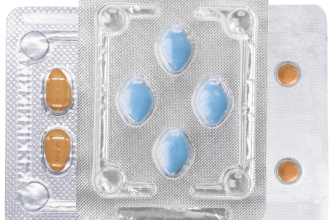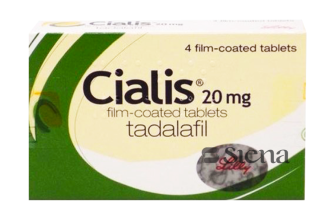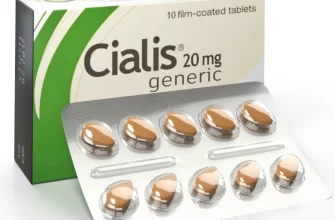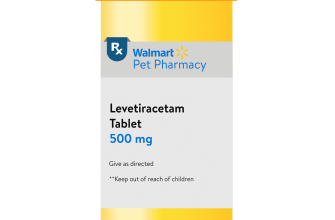Start with the 10mg dose unless your doctor advises otherwise. This lower dosage often provides sufficient erectile support for many men, minimizing potential side effects. Observe its effects carefully; if improvement is insufficient, your physician can then safely increase your prescription to 20mg.
The 20mg dose provides a higher concentration of tadalafil, leading to potentially stronger and longer-lasting effects. However, this increased potency also increases the chance of experiencing side effects such as headache, flushing, or indigestion. Individual responses vary significantly; what works best depends entirely on your specific physiology and health status.
Consider your age and overall health. Older men or those with pre-existing conditions might find the 10mg dose more suitable to avoid unnecessary side effects. Conversely, younger men with more robust health might benefit from the increased efficacy of the 20mg tablet, assuming their doctor approves.
Always consult your doctor before making any changes to your medication. They can assess your individual needs and medical history to recommend the appropriate dosage, ensuring both efficacy and safety. Never adjust your dosage without professional medical guidance.
- Understanding the Dosage Difference
- Effectiveness: Which Dosage Works Better?
- Higher Dose, Stronger Effect?
- Individual Variation is Key
- Side Effects Matter
- Side Effects: A Comparison of Potential Risks
- Cost Comparison: Is the Higher Dosage Worth the Price?
- Choosing the Right Dosage: Factors to Consider
- Interaction with Other Medications: Important Precautions
Understanding the Dosage Difference
Cialis 20mg provides a higher concentration of tadalafil than the 10mg dose. This means it may offer a stronger and longer-lasting effect for some men.
However, a higher dose isn’t always better. Many men find 10mg perfectly effective. Starting with 10mg allows for a titration process; your doctor can adjust the dosage based on your response. If 10mg proves insufficient, increasing to 20mg may be considered.
Dosage depends on individual factors, including age, overall health, and other medications you’re taking. Your doctor will assess these factors and recommend the appropriate starting dose. Never alter your prescribed dosage without consulting your doctor.
Side effects are more likely with higher doses. Common side effects include headache, flushing, and nasal congestion. These are usually mild and temporary. Report any significant or persistent side effects to your doctor immediately.
In short: 10mg is often a suitable starting point. 20mg offers a potentially stronger effect but carries a higher risk of side effects. Individual needs vary greatly; your doctor’s guidance is key to determining the right dose for you.
Effectiveness: Which Dosage Works Better?
The best dosage depends entirely on individual response and the specific needs of the user. A 10mg dose often proves sufficient for many men experiencing mild to moderate erectile dysfunction. It provides satisfactory results without excessive side effects. Many find it a good starting point.
Higher Dose, Stronger Effect?
Increasing to 20mg can significantly enhance the effects for those who don’t achieve desired results with the lower dose. This higher concentration may lead to more robust and longer-lasting erections. However, it also raises the likelihood of experiencing side effects such as headaches, flushing, or nasal congestion.
Individual Variation is Key
Remember, responses vary. What works for one person might not work for another. Doctors usually recommend starting with the 10mg dose. If that proves inadequate, a 20mg dose can be considered after careful assessment. It’s crucial to discuss dosage with your physician before making any changes. They can help determine the most appropriate dosage for your individual circumstances and health profile. Always follow their guidance.
Side Effects Matter
The increased potency of the 20mg dose comes with a trade-off: a higher chance of side effects. Before opting for a stronger dose, carefully weigh potential benefits against the risks. Open communication with your doctor is key to managing these aspects.
Side Effects: A Comparison of Potential Risks
Both Cialis 20mg and 10mg share similar potential side effects, but their frequency and intensity might vary. Generally, higher doses increase the likelihood of experiencing some side effects.
Common Side Effects (Occurring in more than 10% of users):
- Headache: More frequent with 20mg.
- Facial flushing: Can be more intense with 20mg.
- Muscle aches: Slightly more common with 20mg.
- Nasal congestion: Incidence similar for both doses.
- Indigestion: Reported at comparable rates.
Less Common Side Effects (Occurring in less than 10% of users):
- Back pain: Potentially more noticeable with 20mg.
- Dizziness: May occur more often with a higher dose.
- Vision changes (blurred vision, changes in color perception): Risk generally higher with 20mg.
Serious Side Effects (Rare, but require immediate medical attention):
- Sudden vision loss: Seek immediate medical help.
- Prolonged erection (priapism): Requires prompt medical intervention.
- Hearing loss: Consult a doctor immediately.
Dosage Considerations: Your doctor will determine the appropriate dosage based on your individual health profile and medical history. Starting with a lower dose (10mg) might be recommended, allowing your body to adjust before potentially increasing to 20mg if needed. Always discuss any side effects you experience with your physician.
Disclaimer: This information is for educational purposes only and should not be considered medical advice. Consult your doctor before starting any new medication.
Cost Comparison: Is the Higher Dosage Worth the Price?
Generally, Cialis 20mg costs more than Cialis 10mg. However, whether the higher cost justifies the increased dosage depends entirely on individual needs and response to treatment.
Consider this: a higher dosage doesn’t automatically mean better results. Many men find 10mg sufficient, achieving satisfactory results at a lower cost. Starting with a lower dosage allows for cost-effective treatment while observing its effectiveness.
Consult your doctor. They can assess your specific condition and determine the optimal dosage. This personalized approach prevents unnecessary expense. A doctor’s assessment factors in your medical history, current health, and desired outcomes.
Pharmacies often offer various payment plans and discounts. Explore these options to potentially reduce overall medication expenses. Comparing prices across different pharmacies is also advisable.
| Factor | Cialis 10mg | Cialis 20mg |
|---|---|---|
| Initial Cost | Lower | Higher |
| Potential Savings (if effective) | Significant | Lower |
| Effectiveness | Varies by patient | Varies by patient |
| Doctor’s Recommendation | May be sufficient | May be necessary |
In short: Prioritize a conversation with your doctor to determine the correct dosage for your needs. Then, compare prices across different pharmacies to find the best value for your prescription.
Choosing the Right Dosage: Factors to Consider
Start with your doctor. They will assess your overall health and medical history to determine the appropriate starting dose. This personalized approach is key.
Your age plays a role. Older men may require a lower dose due to potential interactions with other medications or age-related changes in the body’s metabolism.
Liver and kidney function impact how your body processes Cialis. Pre-existing conditions affecting these organs necessitate careful dosage adjustments, often requiring a lower starting point.
Concurrent medications matter. Some drugs interact with Cialis, potentially increasing or decreasing its effectiveness or side effects. Disclose all medications to your doctor.
Severity of erectile dysfunction influences dosage. Men with mild ED might find 10mg sufficient, while others with more severe symptoms may need 20mg. Your doctor will guide you.
Individual response varies. What works well for one man may not be ideal for another. Dosage adjustments are common, and open communication with your doctor is crucial for finding the optimal dose.
Side effects guide adjustments. If you experience significant side effects at 20mg, a lower dose may be necessary. Report any adverse reactions to your physician immediately.
Regular monitoring is advised. Your doctor might schedule follow-up appointments to evaluate the drug’s efficacy and safety. This enables necessary adjustments based on your response.
Remember: Cialis dosage is not a one-size-fits-all solution. A collaborative approach with your doctor will help find the safest and most effective dose for your specific needs.
Interaction with Other Medications: Important Precautions
Always inform your doctor about all medications you’re taking, including over-the-counter drugs, supplements, and herbal remedies. Cialis can interact negatively with nitrates, often prescribed for chest pain. This combination can cause a dangerous drop in blood pressure.
Alpha-blockers, used to treat high blood pressure and enlarged prostate, may also interact with Cialis, potentially leading to dizziness or fainting. Discuss this possibility with your physician before combining these medications.
Certain antifungal medications, such as ketoconazole and itraconazole, can increase Cialis levels in your blood, potentially enhancing side effects. Your doctor might adjust your Cialis dosage if you’re taking these drugs.
Drugs used to treat HIV/AIDS, particularly protease inhibitors, can also affect Cialis metabolism. Close monitoring by your doctor is advised if you are on both medications.
Grapefruit juice inhibits enzymes that process Cialis. Avoid grapefruit juice while taking Cialis to prevent a potentially dangerous increase in Cialis levels. This also applies to grapefruit itself.
Never adjust your Cialis dosage without consulting your doctor. He or she can help you safely manage potential interactions and achieve the best results while minimizing risks.
Remember: This information is not a substitute for professional medical advice. Always consult your physician or pharmacist before starting or stopping any medication, particularly when using Cialis.







